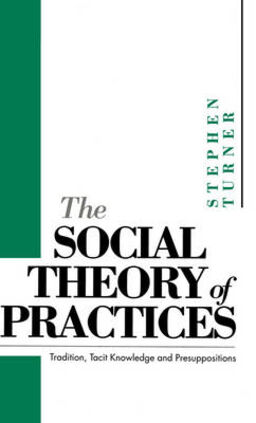
The social theory of practices : tradition, tacit knowledge and presuppositions
Stephen TurnerTurner, Stephen · Bok · Engelsk · utgitt 1994
Ledig
- Automatlager: 1 av 1 ledig
Henter eksemplarliste...
Fakta
Laster innhold...
Kopiér til utklippstavle
*001449890 *00520230227124825.0 *007ta *008130425s1994 enk 000 0 eng c *00903586cam a2200421 c 4500 *019 $bl *020 $a074560504$qib. *020 $a0745613721$qh. *020 $a978-0745613727$qh. *035 $a(EXLNZ-47BIBSYS_NETWORK)999307953264702201 *035 $a(NO-LaBS)14876803(bibid) *035 $a(NO-TrBIB)930795326 *035 $a930795326-47bibsys_network *040 $aNO-TrBIB$bnob$ekatreg *080 $a3.01 *08204$a306.42$223/nor$qNO-KrUA *084 $aMa 17$2ubtkl/2 *1001 $aTurner, Stephen$0(NO-TrBIB)90380966$4aut$_73971300 *24514$aThe social theory of practices :$btradition, tacit knowledge and presuppositions$cStephen Turner *260 $aOxford$bPolity Press$c1994 *300 $ax, 145 s. *5050 $aPractices and their Conceptual Kin ; Practices as Causes ; Practices as Presuppositions ; Transmission ; Change and History ; The Opacity of Practice *5203 $aThis book presents the first analysis and critique of the idea of practice as it has developed in the various theoretical traditions of the social sciences and the humanities. The concept of a practice, understood broadly as a tacit possession that is 'shared' by and the same for different people, has a fatal difficulty, the author argues. This object must in some way be transmitted, 'reproduced', in Bourdieu's famous phrase, in different persons. But there is no plausible mechanism by which such a process occurs. The historical uses of the concept, from Durkheim to Kripke's version of Wittgenstein, provide examples of the contortions that thinkers have been forced into by this problem, and show the ultimate implausibility of the idea of the interpersonal transmission of these supposed objects. Without the notion of 'sameness' the concept of practice collapses into the concept of habit.The conclusion sketches a picture of what happens when we do without the notion of a shared practice, and how this bears on social theory and philosophy. It explains why social theory cannot get beyond the stage of constructing fuzzy analogies, and why the standard constructions of the contemporary philosophical problem of relativism depend upon this defective notion.$cHentet fra forlagets nettside *653 0$aerkjennelsesteori$apraksis$ataus$akunnskap$asamfunnsvitenskapkollektive$ahandlinger$asosiologi$akulturteori$_73971400 *85641$3Omslagsbilde$uhttps://politybooks.com/wp-content/themes/politybooks/images/cover/9780745613727.jpg$qimage/jpeg *85642$3Forlagets beskrivelse (kort)$uhttps://contents.bibs.aws.unit.no/?isbn=0745613721 *85642$3Forlagets beskrivelse (kort)$uhttps://contents.bibs.aws.unit.no/content/?isbn=0745605044 *85642$3Forlagets beskrivelse (kort)$uhttps://contents.bibs.aws.unit.no/content/?isbn=9780745613727 *85642$3Forlagets beskrivelse (lang)$uhttps://contents.bibs.aws.unit.no/?isbn=0745613721 *85642$3Forlagets beskrivelse (lang)$uhttps://contents.bibs.aws.unit.no/content/?isbn=0745605044 *85642$3Forlagets beskrivelse (lang)$uhttps://contents.bibs.aws.unit.no/content/?isbn=9780745613727 *85642$3Innholdsfortegnelse$uhttps://contents.bibs.aws.unit.no/?isbn=0745613721 *85642$3Innholdsfortegnelse$uhttps://contents.bibs.aws.unit.no/content/?isbn=0745605044 *85642$3Innholdsfortegnelse$uhttps://contents.bibs.aws.unit.no/content/?isbn=9780745613727 *85642$3Omslagsbilde$uhttps://contents.bibs.aws.unit.no/files/images/large/1/2/0745613721.jpg$qimage/jpeg *85642$3Omslagsbilde$uhttps://contents.bibs.aws.unit.no/files/images/large/7/2/9780745613727.jpg$qimage/jpeg *901 $a80 *999 $aoai:nb.bibsys.no:999307953264702202$b2021-12-09T03:22:42Z$z999307953264702202 ^